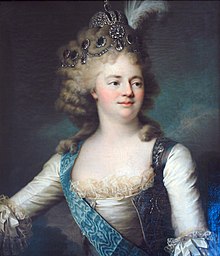Sophie Marie Dorothea of Württemberg
Maria Feodorovna (Russian: Мари́я Фёдоровна; née Sophie Dorothea of Württemberg; 25 October 1759 – 5 November 1828) was Empress consort of Russia as the second wife of Tsar Paul I.
Born Princess Sophie Dorothea of Württemberg, she was a daughter of Friedrich II Eugen, Duke of Württemberg and his wife, Friederike Dorothea of Brandenburg-Schwedt. She belonged to a junior branch of the House of Württemberg and grew up in Montbéliard receiving an excellent education for her time and station. In 1776, when Tsar Paul I, then heir to the Russian throne, became a widower, Sophie Dorothea was chosen by Frederick II of Prussia, her maternal great uncle, and by Empress Catherine II of Russia, as the ideal candidate to be Paul’s second wife. They met in a state dinner in Berlin and their engagement was quickly arranged.
Sophie Dorothea arrived in St Petersburg that September, converted to the Russian Orthodox Church, and took the name Maria Feodorovna. She married Paul on 26 September 1776. In spite of her husband's difficult character, Maria Feodorovna made a success of her marriage. During the long reign of her mother-in-law, the Russian Empress, Catherine II, Maria and Paul were completely excluded from any political influence, as mother and son mistrusted each other. Maria Feodorovna sided with her husband and lost the initial affection Catherine II had for her. Paul and Maria were forced to live in isolation at Gatchina, but they were devoted to each other and had ten children including: Tsar Alexander I, Tsar Nicholas I of Russia, Grand Duchess Maria of Saxe-Weimar-Eisenach, Queen Catherine of Wurttemberg and Queen Anna Pavlovna of the Netherlands.
In 1796, her husband ascended to the Russian throne and during his four-year reign, Maria Feodorovna had a great and beneficial influence over her husband. On the night of Paul I's assassination, Maria Feodorovna thought to imitate the example of Catherine II and tried to proclaim herself Empress, but did not press her claims. During the reigns of her sons Alexander I and Nicholas I, Maria Feodorovna retired to live at Gatchina and Pavlovsk, but kept the highest female position at court. This custom of precedence of the Dowager Empress over the wife of the reigning monarch was introduced with her and it was unique to the Russian court. She outshined the wives of Alexander I and Nicholas I as she had considerable influence over her sons. Maria Feodorovna also managed all the charitable establishments and enjoyed a considerable income. She was held in great respect by all her children who turned to her for counsel and advise. Her death in 1828 was deeply mourned by the imperial family and her successors as Empress consorts looked to her as a role model.
...
Wikipedia


